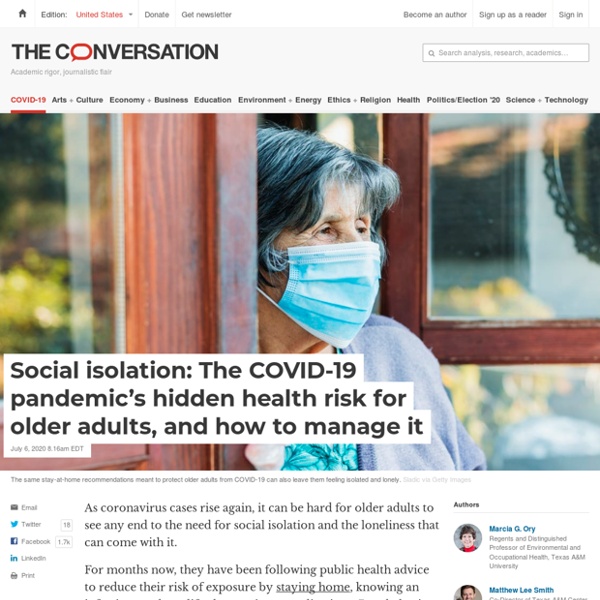COVID-19: Ensuring the elderly don't become isolated during the outbreak
SINGAPORE: Organisations that provide care and support for the elderly are stepping up outreach efforts to prevent loneliness and heightened isolation among old folks during tighter safe distancing measures put in place during the COVID-19 pandemic. To protect seniors – a vulnerable group at a higher risk of getting a severe infection – activities for them were already suspended earlier in March. With further distancing measures in place, the lack of social interaction and physical activity could have a negative impact on the mental and physical health of vulnerable elderly populations, said Dr Chris Tsoi a senior consultant from the department of psychological medicine at the National University Hospital (NUH). Madam Koh lives alone and has already seen reduced social interactions over the past few weeks.
COVID-19 and Social Isolation Puts Elderly at Risk for Loneliness
By Gary Call, MD To protect our elderly and chronically ill from COVID-19, we’ve asked this population to isolate at home. This is the best way to keep them safe. But how do we protect this population, already at high risk for loneliness, from the health risks that come with isolation?
Social isolation and the elderly poor in Singapore
SINGAPORE: Her one-room flat was a cluttered mess, and Madam Helen Fernandez herself never seemed to bathe, said her neighbours who always saw her in the same set of clothes. When case workers first visited the unkempt and confused elderly widow, they had to rush her to hospital for very high blood pressure – which resulted because she hadn’t been taking her medication and had been missing doctors’ appointments. Since her husband died 17 years ago, Mdm Fernandez had been living alone with no friends or family – and slowly falling prey to loneliness and dementia.
Solutions from Around the World: Tackling Loneliness and Social Isolation During COVID-19
The interventions from other countries include low-tech community-based programs, high-tech digital approaches, nurse-led care coordination models, and proactive national policies to reduce loneliness. Mobilizing Volunteers. Several countries have organized volunteer telephone support services to help connect with older adults. In Ireland, Friends of the Elderly schedules regular phone calls between older adults and trained part-time volunteers. A similar program in Canada, called Friendly Phone Program, is organized by the local Red Cross.
Cognitive Development in Late Adulthood - PSY 180 - Psychology of Aging - Textbook - LibGuides at Hostos Community College Library
Cognitive Development in Late Adulthood There are numerous stereotypes regarding older adults as being forgetful and confused, but what does the research on memory and cognition in late adulthood actually reveal? In this section, we will focus upon the impact of aging on memory, how age impacts cognitive functioning, and abnormal memory loss due to Alzheimer’s disease, delirium, and dementia. Cognitive Development and Memory in Late Adulthood How does aging affect memory?
The consequences of socially isolating seniors - TMC News
As social creatures, humans are naturally hardwired to seek companionship and social connection, but COVID-19 is forcing people to adapt to a new reality anchored by social distancing and isolation. :::::::::::::::::::::::::::::::::::::::::::::::::::::::::::::::::::::::::::::::::::::::::::::::::::::::::::::::::::::::::::::::::::::::::::::::::::::: Looking for the latest on the CORONAVIRUS? Read our daily updates HERE
Elderly Social Isolation, Loneliness in COVID-19 May Lead to Cognitive Decline
THURSDAY, Sept. 17, 2020 (HealthDay News) -- Social isolation and loneliness can increase the risk for cognitive decline in seniors, according to Carla Perissinotto, M.D., geriatrician and associate chief for geriatrics clinical programs at the University of California in San Francisco, who recently spoke with HD Live! about the current challenges facing seniors in assisted living or nursing homes during the COVID-19 pandemic. While people are having to socially and physically distance to protect their health now, the long-term health effects of this isolation remain unknown, Perissinotto said. Being able to socialize and be physically active are both health-protective measures, and similar to the model of "use it or lose it" in regard to muscle development, a lack of social interaction can be detrimental to a person's cognitive health and even increase the risk for developing dementia over time by 50 percent, she explained.
Promoting Cognitive Functions for the elderly
We recently published an evidence-based resource to support local authorities, commissioners and providers to promote cognitive health in older adults aged 55 and above. This is an important issue because, whilst the fact that people are living longer lives is a public health success story, we know that many of these extra years are spent in ill health or disability. The next challenge for the health and social care sector is to support individuals to prevent ill health in later years and increase healthy life expectancy, so it's crucial that older adults are supported to maintain and improve their physical, mental and social health and wellbeing. An alarming proportion of mid-life and older adults are physically inactive, smoke, misuse alcohol, have poor eating patterns and are socially isolated, putting them at risk of substantially increased mortality and ill health. The resource is based on three systematic reviews conducted by the Cambridge Institute of Public Health (CIPH).



